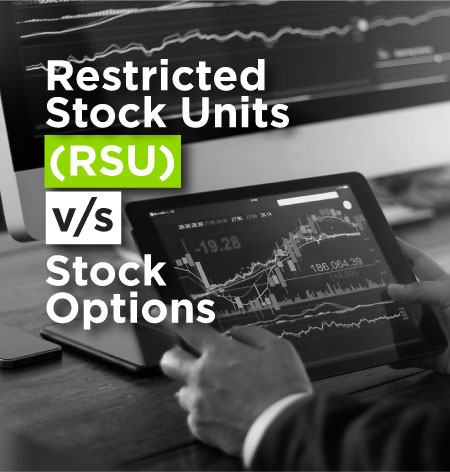Difference Between Restricted Stock Units (RSU) And ESOP in India
Stock-based Compensation is the most prevalent way of attracting, retaining, and rewarding employees of any Organization.They inculcate a sense of ownership in the employees. It is a two-way beneficial instrument and is widely used by Organizations.
Stock-based Compensationcan be issued to employees in various forms. Two types of widely available Stock-based Compensation for any employee are Restricted Stock units (RSU) and Employee Stock Options (ESOP).
RSU and ESOP have their pros and cons. Though both are a form of Stock-based compensation but are treated differently from various perspectives. Employees usually face challenges in understanding the differences between these two.
In this article, we have tried to explain what RSU and ESOP are and how they are different from each other.
RESTRICTED STOCK UNITS (RSU):
Restricted Stock Units are a form of Stock-based Employee Compensation that awards stock shares as a part of a restricted stock unit award. The recipient must meet certain pre-set conditions before the stock units can be transferred to him. As the name suggests, the stock underlying RSU is restricted based on certain conditions which might be related to the duration of service or performance milestones, which once met will make the employee-owner of the stock.
These units are subjected to some vesting period, that may be decided by the employer and will be assigned to employees once the vesting period is over, giving them a tangible stake in the Company’s equity.
Illustration:
Employee A has been awarded 100 RSUs by his Employer XYZ Pvt. Ltd. These RSUs are granted with a vesting period of 2 years (time-based restriction). On completion of 2 years, 100 RSUs will become shares and A will be the owner of 100 shares of XYZ Pvt. Ltd.
EMPLOYEE STOCK OPTION (ESOP):
Employee Stock Options (Stock options), as the name suggests are a form of Stock-based Compensation that provide the employee a right, but not an obligation to get a certain pre-determined number of shares of the Company at a pre-determined price at a pre-determined date. As the name suggests, it is only a right/option provided to the employee but not an obligation. The employee can exercise his discretion on whether to exercise or not the stock options.
ESOPs are also subject to a vesting period, which may be decided by the Employer and will be available to employees for exercise after the vesting period is completed.
Illustration:
Employee B has been granted 100 ESOP by his employer ABC Pvt. Ltd. The vesting schedule is 3 years from the date of grant and the exercise price is fixed at Rs.10/- per option. After completion of 3 years, B has a right to exercise and convert ESOPs to shares by paying an exercise price of Rs.1000/- (100 options X 10 per option). Once exercised, B becomes a shareholder of 100 shares in ABC Pvt Ltd.

Major differences between Restricted Stock Units (RSU) and Stock Options (SO):
| Basis of Difference | ESOP | RSU |
| Meaning | Through Stock options,shares of a company can be purchased by an employee at a predetermined price over a pre-determined period | Restricted Stock Units grant shares to the employee of the Company meeting certain specific mentioned criteria. |
| Nature | It is an option given to employees but not an obligation | It is not an option, upon vesting shares are mandatorily issued to employees |
| Grant | Stock options are granted | Stock units are awarded |
| Vesting | ESOPs are vested over a period, based on a vesting schedule pre-fixed by the employer | The vesting is generally associated with the duration of service or performance-based milestones |
| Price | The pre-determined exercise price shall be paid by the employee if he wishes to exercise ESOP | Usually, no exercise price is to be paid by employees. RSUs are free of cost. |
| Shares | Shares are allotted upon exercise | Shares are allotted upon vesting |
| Settlement | Only shares can be received at the time of exercise | Shares or cash can be received at the time of vesting |
| Risk | Comparatively riskier as there is a chance of the value of the stock option being Zero if the fair market value is equal to or less thanthe exercise price | Less risky as employees have not paid any price to get the shares |
| Taxation | The difference between the exercise price and fair market value on the date of exercise is taxed as part of the salary | The fair market value of shares received on the date of vesting is taxed as part of the salary |
| Complexity | An easy pre-determined vesting schedule makes it easier to administer and implement | Vesting is usually based on performance milestones or duration of service |
CONCLUSION:
Despite being different from each other, RSU and ESOP – both are beneficial to employees in the long term. Which one to choose would depend on the employee’s risk-taking appetite and his assessment ofthe future performance and growth of the Company. A Company can offer more than one form of stock-based compensation to its employees, based on the stage of the company and the contribution of employees. To get a detailed advisory on which form of compensation to offer and how to implement it, please reach out to Ms. shilpa@simplybiz.in.
This Article has been authored by Ms. Pooja Jain from our Team.

Leave A Comment